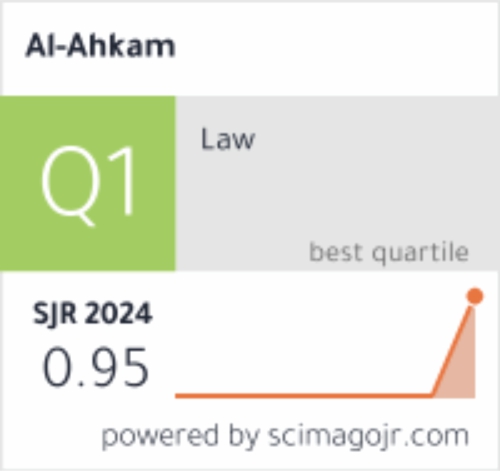Sirri Marriage Celebration and Its Impact on Social Change in Banjarese Community, South Kalimantan
DOI:
https://doi.org/10.21580/ahkam.2022.32.2.12789Keywords:
sirri marriage, Islamic law, costumary law, BanjareseAbstract
This study seeks to reveal that sirri marriages, which are usually secret, in the Banjar community are carried out openly and are carried out by walimah 'ursy (wedding ceremonies). In contrast to other studies, most of them only discuss the law of unregistered marriage and its legality in Indonesia. This study tends to pay more attention to aspects of habits and shifts in the meaning of the sirri marriage. The method used in this study is empirical with an ethnographic-phenomenological approach to the celebration of sirri marriages in the Banjar community, South Kalimantan. The results of this study prove that the legality of sirri marriages is illegal in Indonesia State because it is not recorded at the Office of Religious Affairs. However, aspects of the habit of unregistered marriages and holding wedding celebrations in the Banjar community, make sirri marriages "as if" they have legal rights in society based on social norms.Downloads
References
Abror, Khoirul. “Wacana tentang Nikah Sirri dalam Fikih Kontemporer.” ASAS 9, no. 1 (2017).
Afriansyah, Muhammad. “Dinamika Hukum Nikah Sirri di Indonesia Perspektif Hukum Responsif Nonet-Selznick.” PhD Thesis, Universitas Islam Negeri Maulana Malik Ibrahim, 2020.
Ahmadi, Wiratni. “Hak dan Kewajiban Keluarga menurut Undang-Undang Nomor 1 Tahun 1974 tentang Perkawinan.” Jurnal Hukum Pro Justitia 26, no. 4 (2008).
Allendorf, Keera, and Dirgha J. Ghimire. “Determinants of Marital Quality in an Arranged Marriage Society.” Social Science Research 42, no. 1 (2013): 59–70. https://doi.org/10.1016/j.ssresearch.2012.09.002.
Amnawaty, Amnawaty. “Reformasi Sistem Hukum Pencatatan Perkawinan Warga Muslim dan Perlindungan Hukum Anak dari Nikah Sirri.” Nizham Journal of Islamic Studies 7, no. 01 (2019): 17–35.
Ardi, Zadrian, and Nining Maizura. “The Psychological Analysis of Divorce at Early Marriage.” International Journal of Research in Counseling and Education 2, no. 2 (2018): 77–82.
Asman, Jali. “Urgensi Pencatatan Perkawinan menurut Undang-Undang No. 1 Tahun 1974 dan Kompilasi Hukum Islam (KHI) dalam Perspektif Maqashid al-Syari’ah (Studi Kasus Pasangan Nikah Sirri di Wilayah Hukum Kecamatan Marpoyan Damai),” 2017.
Asoodeh, Mohammad H., Shiva Khalili, Manijeh Daneshpour, and Masoud Gh. Lavasani. "Factors of Successful Marriage: Accounts from Self-Described Happy Couples." Procedia - Social and Behavioral Sciences, WCPCG 2010, January 5 1, 2010: 2042–46. https://doi.org/10.1016/j.sbspro.2010.07. 410.
Aziz, Nasaiy. “The Great Phenomenon of Online Sirri Marriage for Male and Female.” Budapest International Research and Critics Institute (BIRCI-Journal): Humanities and Social Sciences 1, no. 3 (2018): 445–50.
Bahrum, Mukhtaruddin. “Legalisasi Nikah Sirri Melalui Isbat Nikah menurut Kompilasi Hukum Islam.” Jurnal Diskursus Islam 1, no. 2 (2013): 210–30.
Bartels, Susan Andrea, Saja Michael, Sophie Roupetz, Stephanie Garbern, Lama Kilzar, Harveen Bergquist, Nour Bakhache, Colleen Davison, and Annie Bunting. “Making Sense of Child, Early and Forced Marriage among Syrian Refugee Girls: A Mixed Methods Study in Lebanon.” BMJ Global Health 3, no. 1 (2018).
Bawono, Yudho, and Suryanto Suryanto. “Does Early Marriage Make Women Happy?: A Phenomenological Finding from Madurese Women.” Journal of Educational, Health and Community Psychology 8, no. 1 (2019): 85–100.
Bhandari, Nub Raj. “Early Marriage in Nepal: Prospects for Schoolgirls.” Journal of International Women’s Studies 20, no. 3 (2019): 88–97.
Celik, Ismail, Medera Halmatov, Sultanberk Halmatov, and Hakan Saricam. “Research on Views About Male University Students’ Marriage and Future Family Role Expectation.” Procedia - Social and Behavioral Sciences, 4th World Conference on Educational Sciences (WCES-2012) 02-05 February 2012 Barcelona, Spain, 46 (2012): 3275–78. https://doi.org/10.1016/j.sbspro.2012.06.050.
Fakhria, Sheila. “Menyoal Legalitas Nikah Sirri (Analisis Metode Istiṣlāḥiyyah).” Al-Ahwal: Jurnal Hukum Keluarga Islam 9, no. 2 (2017): 185–200.
Fitzpatrick, Mary Anne. “A Typological Approach to Marital Interaction: Recent Theory and Research.” In Advances in Experimental Social Psychology, edited by Leonard Berkowitz, 18:1–47. Academic Press, 1984. https://doi.org/10.1016/S0065-2601(08)60141-0.
Haliah, Dahlia. “Nikah Sirri dan Perlindungan Hak-Hak Wanita dan Anak (Analisis dan Solusi dalam Bingkai Syariah).” Al-Ahkam Jurnal Ilmu Syari’ah dan Hukum 1, no. 1 (2016).
Hosseinkhanzadeh, Abbas Ali, and Eilaman niyazi. “Investigate Relationships between Religious Orientation with Public Health and Marital Satisfaction among Married Students of University of Tehran.” Procedia - Social and Behavioral Sciences, 3rd World Conference on Educational Sciences - 2011, 15 (2011): 505–9. https://doi.org/10.1016/j. sbspro.2011.03.131.
Hyseni Duraku, Zamira, Liridona Jemini-Gashi, and Ervin Toçi. “Perceptions of Early Marriage, Educational Aspirations, and Career Goals among Kosovar Adolescents.” Marriage & Family Review 56, no. 6 (2020): 513–34.
Islami, Irfan. “Perkawinan di Bawah Tangan (Kawin Sirri) dan Akibat Hukumnya.” Adil: Jurnal Hukum 8, no. 1 (2017): 69–90.
Jawawi, Abdullah. “Nikah Sirri dalam Perspektif Islam, Kristen dan Hukum Positif Indonesia.” Ekspose: Jurnal Penelitian Hukum dan Pendidikan 17, no. 2 (2019): 709–20.
Keshavarz, Azita, Hussain Akbari Amrgha, and Najmeh ‘Melatkhah. “Effectiveness of Marriage Education Before Marriage Change Irrational Beliefs Girls.” Procedia - Social and Behavioral Sciences, The 3rd World Conference on Psychology, Counseling and Guidance, WCPCG-2012, 84 (2013): 520–24. https://doi.org/10.1016/j.sbspro.2013.06.596.
Khalatbari, Javad, Shohreh Ghorbanshiroudi, Kiomars Niaz Azari, Nikta Bazleh, and Niayesh Safaryazdi. “The Relationship between Marital Satisfaction (Based on Religious Criteria) and Emotional Stability.” Procedia - Social and Behavioral Sciences, The 3rd World Conference on Psychology, Counseling and Guidance, WCPCG-2012, 84 (2013): 869–73. https://doi.org/10.1016/j.sbspro.2013.06.664.
Khisni, Akhmad, and Rozihan Rozihan. “Civil Rights of Children Outside Married Due Isbat Nikah of Polygamy (Analysis of Islamic Court of Rembang Decision No. 99/Pdt. G/2018/PA. Rbg.).” Jurnal Daulat Hukum 2, no. 4 (2020): 617–24.
Khoiriyah, Rihlatul. “Aspek Hukum Perlindungan Perempuan dan Anak dalam Nikah Siri.” Sawwa: Jurnal Studi Gender 12, no. 3 (2018): 397–408.
Lubis, Sulhanuddin. “Implikasi Nikah di Bawah Tangan terhadap Proses Permohonan Penerbitan Akta Kelahiran Anak menurut Undang-Undang No. 1 Tahun 1974 tentang Perkawinan (Studi Kasus di Dinas Kependudukan dan Catatan Sipil Kota Medan).” PhD Thesis, Universitas Islam Negeri Sumatera Utara, 2019.
Masturiyah, Masturiyah. “Nikah Sirri; Prespektif Hukum Islam dan Hukum Perkawinan Nasional.” Musãwa Jurnal Studi Gender dan Islam 12, no. 1 (2013): 43–62. https://doi.org/10.14421/musawa.2013. 121.43-62.
Menon, Seetha. “The Effect of Marital Endowments on Domestic Violence in India.” Journal of Development Economics 143 (2020): 102389. https://doi.org/10.1016/j.jdeveco.2019.102389.
Rahmiyati, Rahmiyati, Diana Rahmi, and Nadiyah Nadiyah. “Siri Marriage Practices in Makmur Village Community, in Gambut, Banjar District.” Syariah: Jurnal Hukum dan Pemikiran 20, no. 1 (2020): 27–40.
Rusli, Rusli, Nur Mohamad Kasim, and Duke Arie Widagdo. “Law Enforcement on the Inheritance of Siri Married in the Judicial Verdict.” Al-Bayyinah 4, no. 2 (2020): 133–50.
Sarmini, Ms, Ulin Nadiroh, and Aminatuz Zuhriyah. “The Pattern of Early Marriage for Girls.” In 1st International Conference on Social Sciences (ICSS 2018). Atlantis Press, 2018.
Wong, Sowan, and Robin Goodwin. “Experiencing Marital Satisfaction across Three Cultures: A Qualitative Study.” Journal of Social and Personal Relationships 26, no. 8 (2009): 1011–28.
Wong, Sowan, and Robin Goodwin. “The Impact of Work on Marriage in Three Cultures: A Qualitative Study.” Community, Work & Family 12, no. 2 (2009): 213–32.
Xie, Julan, Zhiqing E. Zhou, and Yanping Gong. “Relationship between Proactive Personality and Marital Satisfaction: A Spillover-Crossover Perspective.” Personality and Individual Differences 128 (2018): 75–80. https://doi.org/10.1016/j.paid.2018.02.011.
Zainuddin, Zainuddin & Afwan. Kepastian Hukum Perkawinan Sirri dan Permasalahannya Ditinjau dari Undang-Undang Nomor 1 Tahun 1974. Yogyakarta: Deepublish, 2017.
Downloads
Published
How to Cite
Issue
Section
License
By submitting an article to the journal, the author(s) agree to transfer the published article's copyright to the journal, which will act as the publisher. This means the journal will have the right to publish the article in various forms, including reprints. The journal will maintain the publishing rights to the published articles.
In line with the license, authors and third parties (readers, researchers, and others) are allowed to share and adapt the material. In addition, the material must be given appropriate credit, provided with a link to the license, and indicated if changes were made. If authors remix, transform or build upon the material, authors must distribute their contributions under the same license as the original.



